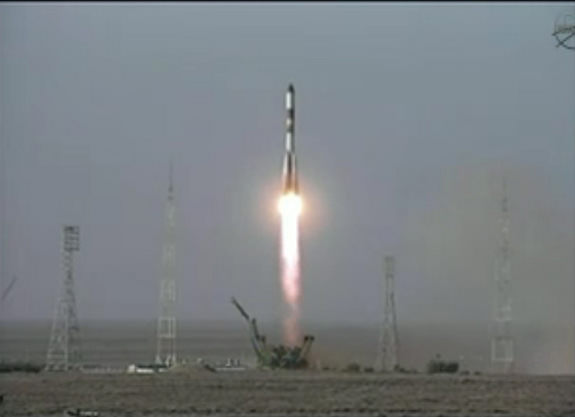[/caption]
The Russian news agency
Itar-Tass
is reporting that the cause of the August 24 failure and crash of the Progress re-supply ship that was supposed to bring supplies to the International Space Station may have already been determined. "Members of the emergency commission have determined the cause of the failure of the Soyuz carrier rocket's third stage engine," Roscosmos spokesman Alexei Kuznetsov was quoted. "It is a malfunction in the engine's gas generator."
If the cause has indeed been found and if the anomaly can be resolved to the satisfaction of both Roscosmos and NASA, it might prevent a worst-case scenario of
having to de-crew the International Space Station by mid-November,
which NASA Space Station Program Manager Mike Suffredini said was a potential outcome.
[caption id="attachment_88552" align="aligncenter" width="400" caption="The Soyuz launch sequence, showing the time of the anomaly. Credit: ESA"]
[/caption] The emergency commission to study the problem was only formed on August 26, and that a cause has already been found comes as a bit of a surprise. The commission is lead by Anatoly Koroteev, head of the Russian Keldysh science research institute on rockets.
"He is a man with quite a bit of experience in this field for our Russian colleagues, and indeed the world," Suffredini said during a press briefing on Monday morning. But Suffredini also said that it would likely take the commission awhile to sort out the cause and its implications to future flights.
"The team is just getting going," Suffredini commented. "They are trying to work quickly to resolve the anomaly but they don't want to leave any stone unturned."
What actions will be taken to resolve the problem now that a cause may be established are not yet known. Suffredini said that two Soyuz-family unmanned rockets are scheduled to launch soon, which may provide a chance to test any fixes on unmanned launches before attempting a manned launch. A commercial Soyuz to launch a mobile communications satellites is scheduled on Oct. 8, and the Russians may launch the Progress resupply ship that is currently scheduled for October 26 a few weeks earlier in order to have another unmanned launch to study the problem.
The Progress cargo ships launch on a Soyuz-U rocket, while the Soyuz crew capsules, the Soyuz TMA launches on a Soyuz-FG. The third stages of the two rockets are virtually identical. The Soyuz-U rocket has had 745 successful launches and just 21 failures over nearly four decades. The Soyuz-FG has had 25 launches, all successful.
 Universe Today
Universe Today
